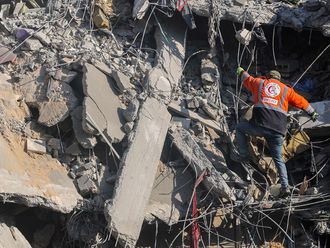
JERUSALEM: Israeli Prime Minister Benjamin Netanyahu has dissolved the six-member war cabinet, an Israeli official said on Monday, in a widely expected move that came after the departure from government of the centrist former general Benny Gantz.
Netanyahu is now expected to hold consultations about the Gaza war with a small group of ministers, including Defence Minister Yoav Gallant and Strategic Affairs Minister Ron Dermer who had been in the war cabinet.
The prime minister had faced demands from the nationalist-religious partners in his coalition, Finance Minister Bezalel Smotrich and National Security Minister Itamar Ben-Gvir, to be included in the war cabinet, a move which would have intensified strains with international partners including the United States.
The forum was formed after Gantz joined Netanyahu in a national unity government at the start of the war in October and also included Gantz's partner Gadi Eisenkot and Aryeh Deri, head of the religious party Shas, as observers.
Israeli media said the move, which was not expected to trigger any major policy shift, was meant to counter pressure from far-right politicians seeking a greater say in decision-making.
The war cabinet was formed after Gantz had left the opposition to join Netanyahu’s government following Hamas’s unprecedented October 7 attack.
Gantz and another member of his party, Gadi Eisenkot, both former military chiefs, had agreed to join the government on condition that a war cabinet be formed, said another Israeli official, speaking on condition of anonymity as he was not authorised to discuss the issue with the media.
Truce and hostage release
With Gantz and Eisenkot out of the government, “there is no longer a need for” the war cabinet, said the official.
“It means that the security cabinet will meet more often. The security cabinet is the body responsible for making decisions (related to the war) anyway.”
Defence Minister Yoav Gallant, National Security Adviser Tzachi Hanegbi and Strategic Affairs Minister Ron Dermer, who were all part of the war cabinet, also sit on the security cabinet - the key forum ratifying decisions regarding the war including truce and hostage release negotiations.
Gantz announced his resignation on June 9 after failing to get Netanyahu to approve a post-war plan for Gaza.
Israeli media reported that Netanyahu dissolved the war cabinet to avoid including far-right coalition members in the sensitive forum, fearing harm to relations with key Western allies such as the United States.
Ben Gvir and Smotrich, who are both security cabinet members and opposed to a truce before Hamas is “eliminated”, have put pressure on Netanyahu to add them to the war cabinet.
The Hamas attack on southern Israel that triggered the war resulted in the deaths of 1,194 people, mostly civilians, according to an AFP tally based on official Israeli figures.
Israel’s retaliatory military campaign in Gaza has killed at least 37,347 people, also mostly civilians, according to the Hamas-run territory’s health ministry. z and Eisenkot both left the government last week, over what they said was Netanyahu's failure to form a strategy for the Gaza war.












